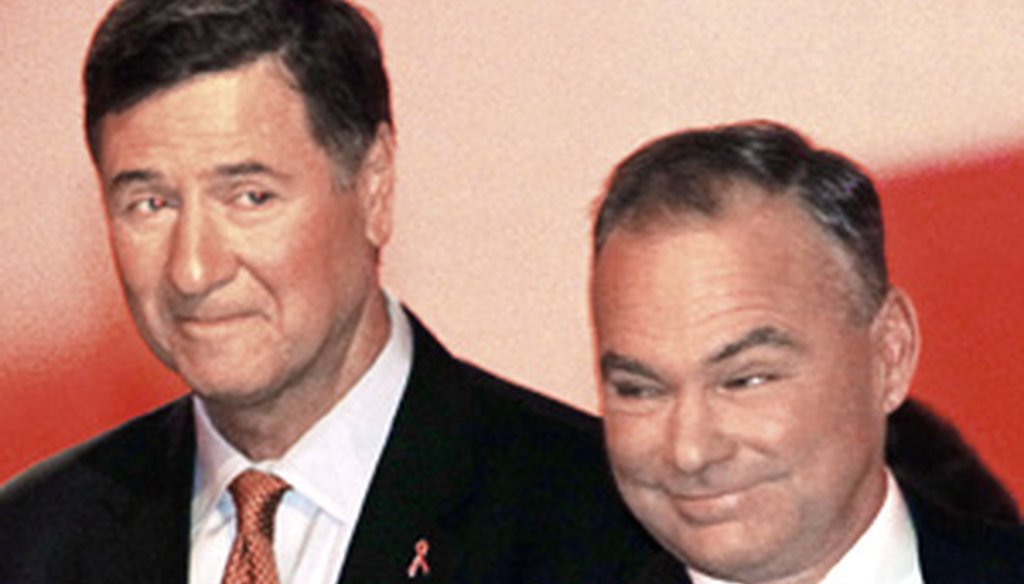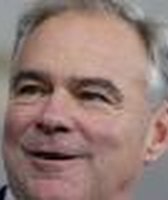Stand up for the facts!
Our only agenda is to publish the truth so you can be an informed participant in democracy.
We need your help.
I would like to contribute

U.S. Senate candidates George Allen, left, and Timothy Kaine thank the panelists after their debate Monday night.
PolitiFact Virginia tuned in on Monday’s U.S. Senate debate between Republican George Allen and Democrat Tim Kaine. In the coming days, we plan to run a few of their claims on our Truth-O-Meter.
For starters, we thought we’d review a number of statements at the debate that we have previously researched.
Kaine: "I’m the only governor in modern times that left office with a smaller general fund budget than when I started."
The general fund supports public education, health programs and public safety. Most of its money comes from state incomes and sales taxes.
When Kaine became governor in January 2006, he inherited a $15.1 billion general fund budget for the 2005-06 fiscal year that started the previous July 1. Virginia, like the rest of the nation, fell into recession two years later, prompting budget cuts. When Kaine left office in January 2010, the general fund was $14.8 billion.
Despite the reduction, the state was spending more money on general fund programs at the end of Kaine’s term than at the beginning. That’s because the state used $1.5 billion federal stimulus money at the end of Kaine’s term support some general fund programs during the recession.
If you count the stimulus money, general fund spending increased by 7.9 percent during Kaine’s term; if you don’t count it, it dropped by almost 2 percent. Under the six governors that preceded Kaine, the general fund grew by an average of 33.8 percent. We have rated a similar claim by Kaine True.
Allen: Kaine, as governor, was "shutting down rest areas" during the last year of his term.
During the recession in 2009, Kaine backed a decision by the Commonwealth Transportation Board to close 19 of the 42 rest stops on Virginia interstates. The closure was expected to save about $9 million, but drew ire from drivers, the travel industry and the American Automobile Association.
Republican Gov. Bob McDonnell, after taking office in 2010, kept a campaign promise to reopen the rest stops during the first 90 days of his administration.
Kaine: "(Allen) went into the United States Senate in 2001 with the biggest surpluses in the history of the United States and six years later left with massive deficits"
The nation was running a budget surplus of $121 billion in fiscal 2001 when Allen was elected to the Senate. The budget plummeted to a $432 billion deficit in 2004, after the economy slowed, Congress cut taxes, expanded Medicare and the nation engaged in two wars. When Allen left office in January 2007, the deficit stood at $161 billion.
In terms of raw dollars, the surplus was projected to come in at a record high when Allen entered office. But economists have told us the best historical measure comes from looking at annual surpluses and deficits as a percentage of the nation’s GDP for a given year. By that gauge, the U.S. had a larger surplus in 1948.
Allen: Says the Affordable Care Act takes "$700 billion out of Medicare to pay for other programs."
PolitiFact has repeatedly written that the Affordable Care Act does not literally cut funding from Medicare’s budget. The Medicare budget will continue to expand. But the growth over 10 years will be $716 billion less than projected. The savings will come from reducing payments to doctors and hospitals.
Kaine: As a U.S. Senator, Allen "was repeatedly voting to raise his own pay."
Kaine has made a similar charge before that Allen voted to raise his congressional pay four times while he was a Senator, a statement we’ve rated Mostly True.
Congress, in 1989, passed an ethics reform law that included an annual cost of living adjustment. The pay increase, based on a formula, became automatic unless Congress voted to stop it.
Allen never supported a bill specifically crafted to increase congressional pay. But Allen voted three times against amendments that would have stopped congressional cost-of-living hikes from going into effect.
Allen: Said when he left the U.S. Senate, the budget was "on a trajectory to being balanced."
As we’ve noted, when Allen left the Senate in 2007, the deficit was $161 billion.
The Congressional Budget Office that January predicted that deficits would diminish and the budget would balance in 2011, with surpluses to follow. But that projection included the expectation that the tax cuts Allen voted for would expire, adding over $300 billion per year for the government coffers. Allen has long supported extending the tax cuts. If his wishes were followed, the projections show that the deficits would continue. We rated this claim Half True.
Our Sources
PolitiFact Virginia, "Rest stops reopen quickly," Sept. 19, 2011.
PolitiFact, "Romney says Obama cut $716 billion from Medicare," Oct. 3, 2012.
PolitiFact, "Paul Ryan said President Obama ‘funneled’ $716 billion out of Medicare ‘at the expense of the elderly,’" Aug. 29, 2012.
PolitiFact Virginia, "George Allen says U.S. was on path to balanced budget when he left the Senate," Aug. 7, 2012.
PolitiFact Virginia, "Tim Kaine said George Allen vote to raise his pay four times while in Senate," July 29, 2012.












































